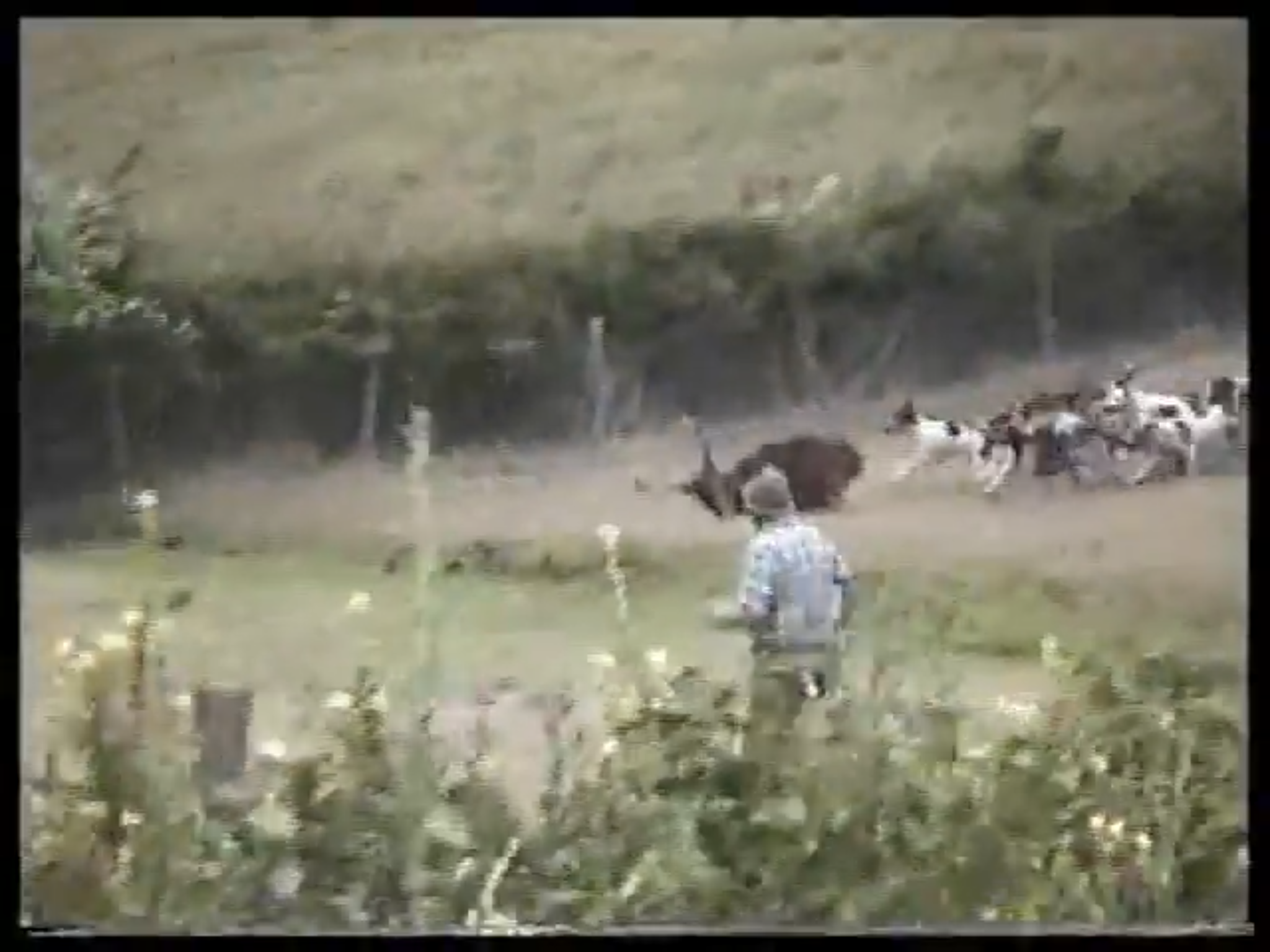8th December 2018
Hunting Myths Pt 3: Hunting Is Efficient & Humane
 Nothing humane or quick about the hunting & killing of this healthy stag by the Quantock Stag Hounds on August 29th 1995. By definition, without the Hunting Act such atrocities would be legal. Stills grab from film taken by Kevin Hill.
Nothing humane or quick about the hunting & killing of this healthy stag by the Quantock Stag Hounds on August 29th 1995. By definition, without the Hunting Act such atrocities would be legal. Stills grab from film taken by Kevin Hill.
OPINION: Zoologist Jordi Casamitjana writes exclusively for Hounds Off
Mr Barrington claims (Horse & Hound, 11.10.18) that hunting causes less animal suffering than other ways to kill such as shooting. This is not true. He claims that shooters often miss and injure the animals they target (which is true and this is why shooting should also be banned) and so hunting is a better alternative. However, he completely omits three key facts:
1) Only in hunting you have the psychological and physical suffering caused by the prolonged chase, which Professor Bateson and Elizabeth L. Bradshaw famously proved with their undisputed research which led to the banning of staghunting in National Trust land many years ago (a ban which, unfortunately, the NT does very little to enforce).
2) The animals may also be injured by the hounds and not be killed straight away if they managed to hide underground on time or to flee into land the hounds cannot enter.
3) Dogs, like most canids (wolves, hyenas, etc.), would not kill their prey by a quick bite in the neck as felids (cats, tigers, etc.) do, but by biting any part of the body they can reach, and keep biting. Therefore, the actual death along (ignoring the suffering already caused by the long chase) is likely to cause lots of pain and suffering.
Need more proof? If a horse is fatally injured in a race, a dangerous animal escapes from a zoo, or diseased livestock needs to be put down, what is the “humane” method the authorities choose to kill the animal? Do they choose death by “dog bites”?
Mr Barrington often claims that hunting is the most efficient way to control foxes, deer and hare. This is a curious way to use the term “efficient”, as it actually means “achieving maximum productivity with minimum wasted effort or expense.” So, comparing it with other wildlife control activities (unfortunately still legal) such as shooting or snaring, how can it be more efficient?
Productivity wise - in this case meaning number of animals killed - a foxhunt will spend most of the day hunting an average of three or four foxes. Often some of these, if not all, get away. And the “wasted effort or expense” of this? Four or five paid hunt staff, dozens of paying filed riders, large vehicles to move the animals around, maintaining large pack of hounds, all the horses and their keep, expensive uniforms, and even all the policing due to allegations of illegal hunting, and public order issues when hunt saboteurs, hunt monitors or other witnesses are around … compared with a vehicle, a torch and a gun, or a stalker, or just a few snares. The most efficient, really? To be clear I think shooting, snaring and hunting should all be banned because they are all cruel and unnecessary. However, if they are ranked by efficiency, how anyone can seriously claim that hunting is the most efficient?
But let’s be generous and accept that there may be people out there who genuinely believe hunts are real “wildlife managers”. Well, it they want to call them like that then hunts are the least effective, least efficient and least humane wildlife managers in existence. So much so, that it almost looks like rather than be composed by ecologists, zoologist, veterinarians or anthropologists with a deep understanding of wildlife and the environment , they are composed by horse riders, bird shooters, dog breeders, livestock farmers, badger baiters and fox diggers. Oh wait … that’s why!
© Jordi Casamitjana
Zoologist
PREVIOUSLY
Hunting Myths Pt 1: The Snakeoil Salesman
Hunting Myths Pt 2: They Only Go For The Sick Old & Weak
Editor's picks
- Best Casino Sites Not On Gamstop
- Online Casinos Not On Gamstop
- UK Betting Sites
- UK Online Casinos Not On Gamstop
- Gambling Sites Not On Gamstop
- Non Gamstop Casinos
- Sites Not On Gamstop
- Non Gamstop Casino Sites UK
- Non Gamstop Casino Sites UK
- Non Gamstop Casino Sites UK
- Non Gamstop Casino Sites
- Top Casino Sites UK
- Casino Not On Gamstop
- UK Online Casinos Not On Gamstop
- UK Casino Not On Gamstop
- Casino Sites Not On Gamstop
- UK Casino Sites Not On Gamstop
- UK Online Casinos Not On Gamstop
- Best Betting Sites
- Casinos Not On Gamstop
- Best Non Gamstop Casinos
- Betting Sites Not On Gamstop Uk
- Sites Not On Gamstop

